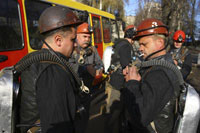Methane blast in Ukrainian coal mine kills at least 69
A methane gas explosion ripped through a coal mine in the Donetsk region of Ukraine. The blast killed at least 69 miners, which became the worst mining disaster in the country in years. The tragedy occurred in one of Ukraine’s deepest and largest coal mines. Fire hampered efforts to save the trapped miners. More than 360 miners were rescued after Sunday's blast, but 35 others remained trapped inside the mine. One miner said he had to clamber over dead colleagues along the rail track and navigate through a blinding dust to escape.

Click here to see photos of the accident
The explosion occurred around 3 a.m. (0100GMT) about 1,000 meters (more than 3,300 feet) deep inside the Zasyadko mine in the regional capital, Donetsk, the heart of the country's coal mining industry, the Emergency Situations Ministry said.
Flags fly at half-mast in the Donetsk region of Ukraine Monday in connection with the three-day mourning. The bodies of forty-nine miners have been retrieved, whereas nothing is known about the fate of 31 other miners.
Ukraine’s President Viktor Yushchenko is expected to arrive in Donetsk Monday. Yushchenko will visit the mine to supervise the process to liquidate the consequences of the methane explosion.
About 460 miners were staying in the mine when the explosion occurred; about 190 of them were close to the scene of the accident.
The accident - the worst in Ukraine in seven years - highlighted the lack of attention to safety in a country with some of the world's most dangerous mines.
President Viktor Yushchenko blamed his Cabinet for not doing enough to reform coal mining and ordered an official panel to investigate the accident and bring those responsible to account.
Local authorities declared three days of mourning for the dead miners.
Dozens of teary-eyed relatives gathered at the mine's headquarters in Donetsk waiting for news on their loved ones. As grim-faced officials emerged to announce the names of the workers found dead, the relatives broke into sobs and cries. Some fainted.
Natalia Piskun, a middle-aged woman who waited for news on her husband, who was among those believed trapped inside the mine, said she would never forgive the mine's director if her husband was found killed.
"If, God forbid, he is lost, I promise I will, if I manage, I will bite this fat beast on his leg! I promise, I swear to you," Piskun, her face distorted by anger and pain, told AP Television News.
Prime Minister Viktor Yanukovych, a native of the mining region, visited the site about 730 kilometers (450 miles) southeast of Kiev, pledging to help victims' families.
Authorities evacuated 367 miners. Twenty-eight were hospitalized, the ministry said.
Vitaliy Kvitkovsky, a miner in his 30s, was among those evacuated. He said he had to walk over the bodies of his dead colleagues in order to climb to the surface.
"The temperature increased sharply and there was so much dust that I couldn't see anything. ... So I was moving by touch over dead bodies along the rail track," Kvitkovsky said in footage broadcast on Ukraine's Channel 5 television.
Experts say Ukraine's mines are dangerous largely because they are so deep, typically running more than 1,000 meters (3,280 feet) underground. In comparison, most European coal beds lie at a depth of 500 to 600 meters (1,640 to 1,970 feet).
Methane is a natural byproduct of mining, and its concentration increases with depth. More than 75 percent of Ukraine's some 200 coal mines are classified as dangerous due to high methane concentrations.
Mines must be ventilated to prevent explosions, but some rely on outdated ventilation equipment, officials said. Safety violations and negligence add to the problem.
Yanukovych said a safety watchdog had reported that miners were working in accordance with norms.
"This accident has proven once again that a human is powerless before the nature," he said.
It was the deadliest mine accident in Ukraine since an explosion at the Barakova mine in the eastern Luhansk region killed 81 miners in March 2000.
Last year, a blast at the mine killed 13 workers. In 2002, an explosion killed 20 and 54 died in a similar explosion in 2001. In May 1999, 50 miners were killed in a methane and coal dust blast there.
Since the 1991 Soviet collapse, more than 4,700 miners in Ukraine have been killed. For every 1 million tons of coal brought to the surface in Ukraine, three miners lose their lives, according to official data.
Despite the dangers, there is growing appetite for Ukraine's rich coal reserves, particularly amid rising natural gas prices. The government has called for production to be increased by a third to 80 million tons this year.
Subscribe to Pravda.Ru Telegram channel, Facebook, RSS!


